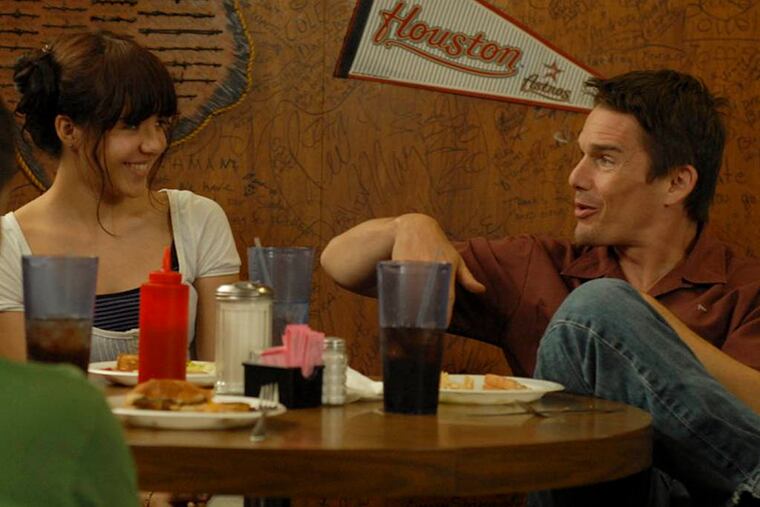'Boyhood': Man, is it good
Richard Linklater catches lightning in a bottle in "Boyhood, a drama taken from footage shot over 12 years in a boy's life.

THE TERRIFIC "Boyhood" introduces us to a new theory of time we'll call Linklater's Law: That one adolescent day in a GTO equals 10 in the minivan of middle age.
Director Richard Linklater arrives at this principle by following the arrow of time through "Boyhood" as it traces the bell curve of life.
First youth, and the long climb to the top of the curve, days lengthened by deeply felt firsts. The arrow peaks, and drops into its speedy descent of compressed time and compromises, car pools and Chrysler minivans. Check the rearview, dad. You might see that convertible muscle car you had when you were young and everyday was its own leisurely eternity.
There is really nothing like the strange visual power of "Boyhood" in the cinematic history - full, though it is, of performers whose familiar faces pop up like weathering signposts on some highway of time.
"Boyhood" is different, unprecedented. Linklater has taken a 6-year-old, filmed him for a few days each year through age 18, and assembled this footage into a coming-of-age story about a kid named Mason (Ellar Coltrane) growing up in small-town Texas.
It's an ingenious idea, perfectly executed. One of Linklater's shrewd decisions: there are no title cards announcing the year or the boy's age. One scene melts into the next, and Mason has simply changed, sometimes in small ways, sometimes monumentally.
The sensation is unique - a bit like seeing nieces and nephews once a year at Thanksgiving, but with holidays 15 minutes apart, and 12 in a row. The closest thing we've had to this real-time time-lapse effect is the "Harry Potter" franchise, a fact that Linklater acknowledges in one of the movie's many delightful bits of cultural punctuation.
The movie is a deceptively casual collage of events that, taken together, illuminate adolescence and also the approach of middle age. We begin to understand the title's double meaning - how it also describes the delayed maturation of Mason's father (Ethan Hawke), who left via divorce when Mason was born and re-enters his life as the movie begins, doing his best to be an effective every-other-weekend dad.
Mason grows into a reedy, artistic kid, soaking up lessons from first jobs, first loves, mentors good and bad. Dad acquires an ill-judged mustache, a paunch, trades the romance of a frontier life in Alaska for a job selling insurance, his GTO for a third-row seat. He also acquires a second wife, another family, and this time he's ready for it. Linklater has always been a generous, humane storyteller - his characters are allowed to outlive their mistakes.
That goes triple for Mason's mom (Patricia Arquette), who drags Mason and his sister (Lorelei Linklater, the director's charming daughter) from town to town, from man to man, working hard to be the reliable provider she can't seem to find in the opposite sex. She's rewarded with the movie's most conventional speech (you'll hear it on Oscar night), but deeply deserved.
This is a movie about growth spurts - Mason's, and Linklater's own as an artist. He has, at this stage in his career (you need to see "Bernie"), acquired the novelist's ability to tell the story of a person, a place and a period simultaneously, and with ease.
His easy-going narrative is deceptively rich, describing a generation of kids who've grown up in fractured families - the project is a joint venture, reflecting the autobiographical experiences of Linklater, Hawke and even young Mr. Coltrane, all products of divorce.
But there is no bitterness here, a Linklater hallmark. He has a Texan's live-and-let-live attitude. He takes folks as they come - note the way he handles the scene in which hipster Mason meets his dad's new in-laws, in their red-state home of guns and Bibles.
The movie is full of affection and wisdom. It's brilliantly directed, deftly performed, and it would not surprise me at all if it one day was named best picture of the year.
Quite an achievement for the erstwhile "Slacker," who would no doubt love to spend a day shooting the breeze about how there is actually research to support the way his movie bends time.
Linklater's Law is apparently real. Researchers have recently confirmed that teen hormones fire the growth of neurons that record the days of youth with a special attentiveness. As we age, our emotions are less engaged, our days more forgettable, less novel (and, of course, when we are raising teens we sometimes want the days to be shorter).
We become more efficient at managing time, less capable of enjoying its fullness. It's called the habituation hypothesis.
Happily, there are things to break the cycle. Moments of awe, when we encounter something transcendent, like a "stirring piece of artwork."
Linklater has given us that, and given those who see it a nice, long day.